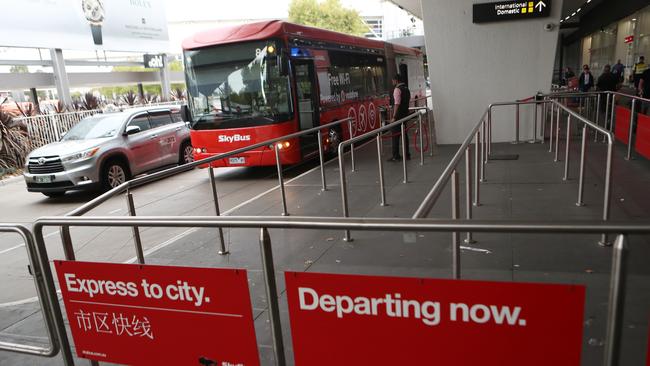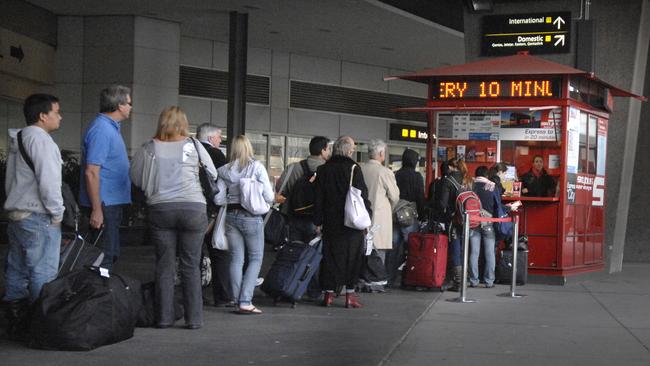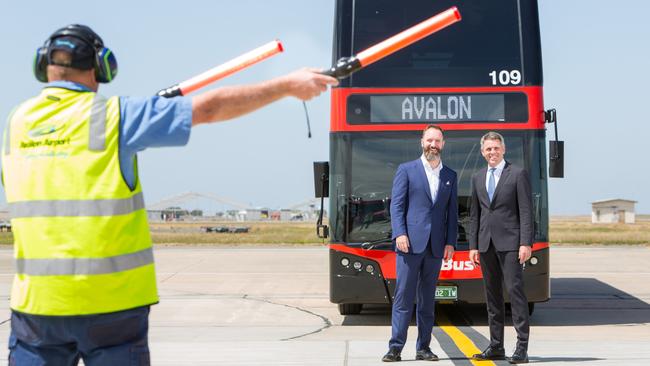SkyBus ticket sales top $66m as it swings into lobby mode against Melbourne Airport rail link
IT has slammed the federal government’s pledge to tip $5 billion into a Melbourne Airport rail link. So just how much does shuttle bus operator SkyBus earn from its lucrative monopoly? We reveal all.
Business
Don't miss out on the headlines from Business. Followed categories will be added to My News.
SKYBUS is raking in more than $66 million a year in ticket sales from its lucrative airport routes.
Ticket sales have surged more than 30 per cent in three years, the Herald Sun can reveal, as Melbourne Airport handles record-breaking numbers of passengers and new routes have been added to the Skybus network.
READ MORE: SKYBUS FUMING OVER AIRPORT RAIL LINK PLAN
STATE, FEDERAL ELECTIONS TO SHAPE MELBOURNE AIRPORT RAIL LINK ROUTE
TURNBULL GUARANTEES AIRPORT RAIL LINK
The private shuttle operator has also pocketed more than $18 million in profit in two years, financial reports show.
The details are contained in financial reports lodged with the corporate regulator by private companies behind SkyBus.
It comes after SkyBus slammed the federal government’s pledge to kick in $5 billion to fund a rail link to the Tullamarine airport.

The company last week demanded the federal government “explain the business case” for a rail link.
Latest financial reports from a group called BTI, which operates SkyBus services for Melbourne and Avalon airports, show it collected $66.4 million in revenue during the 2017 financial year — more than $1.2 million every week.
That is up 32 per cent from the $50.4 million it collected in the 2014 financial year.
BTI posted a net profit of $8.2 million for the year to last June — down from the $10.3 million haul it recorded in the 2016 financial year.
Its 2017 accounts show it paid $14.6 million in “access fees and revenue share expenses”.
SkyBus has the concession from Public Transport Victoriato run a service from Melbourne’s main public transport hub, Southern Cross Station, direct to the doors of Tullamarine and Avalon airports.

BTI is part of a wider company called AATS Group.
Its accounts show it collected $80.3 million in revenue last financial year and but only made a profit of $1 million.
The AATS Group accounts include Skybus operations in Queensland and New Zealand, a market it entered in 2015.
SkyBus is ultimately owned by a consortium of investors including private equity house Catalyst Direct Capital Management and OPTrust Private Markets, part of Canadian pension fund OPTrust.
The Herald Sun revealed earlier this month that the Federal government would provide $5 billion for the rail link project — which would also require an investment from the state government — with a view to work starting as soon as 2020 once a route was chosen.

SkyBus has since swing into lobby mode, with co-chief executive Michael Sewards saying Canberra was “committing $5 billion of taxpayers’ money for a gold-plated infrastructure without any business case”.
“Surely Victorians cannot be expected to support a service that is not backed up by a solid business case and sound economics,” he said.
Mr Sewards said SkyBus “welcomes any compelling mass transit rail option that can compete with our services”.
But he added that “surely there are important questions about at what cost the Victorian taxpayer will be asked to contribute (to) both the build of this and the ongoing operations, let alone the fare price a $10-15 billion investment requires for a return to its investors”.



